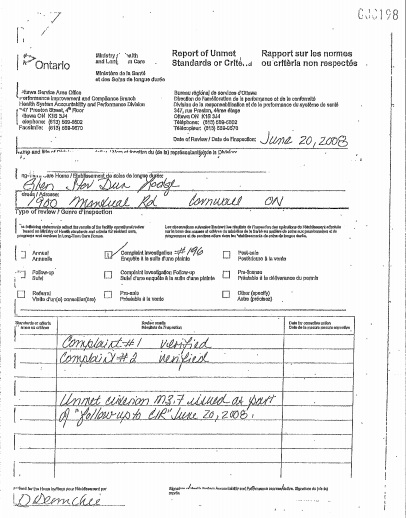Reporting Elder Abuse
There is very clear legislation in the Long Term Care Act identifying abuse and how to report it but for some reason employers have difficulty understanding/enforcing it. You just have to Google Elder Abuse and find the multiple reports of abuse which were only dealt with after a major intervention by someone in or outside the organization. The following is the current as well the requirements in 2008.
Reporting and Complaints;
The Home must have written procedures for initiating complaints to the Home and for how the Home deals with complaints IE Non Abuse Policy which are to be sent immediately to the Ministry.
“Written” complaints include written notification in any format, including anything handwritten, such as letters, notes, correspondence, e-mails, facsimile documents and text messages.
Mandatory Reports;
Homes must Investigate, Respond and Act on every alleged, suspected or witnessed incident of abuse of a resident by anyone or neglect of a resident by the Home or staff that the Home knows of, or that is reported to the Home, and must be investigated immediately and report to the Ministry.
Section 97 – Notification Regarding Incidents A resident’s substitute decision-maker, if any, and any other person specified by the resident must be notified as follows:
Immediately when the Home becomes aware of any alleged, suspected or witnessed incident of abuse or neglect that has caused physical injury or pain to the resident or that caused distress to the resident that could be harmful to the resident’s health or well-being. Within 12 hours when the Home becomes aware of any other alleged, suspected or witnessed incident of abuse or neglect.
Section 98 – Police Notification :The appropriate police force must be notified immediately of any alleged, suspected or witnessed incidence of abuse or neglect of a resident that the Home suspects may constitute a criminal offence.
The Criminal Code of Canada :
265(1) A person commits an assault when
(a) without the consent of another person, he applies force intentionally to that other person, directly or indirectly;
(b) he attempts or threatens, by an act IE gesture, to apply force to another person if he has or causes that other person to believe on reasonable grounds that he has, present ability to effect his purpose; or
(c) openly wearing or caring a weapon or an imitation thereof, he accost or impedes another person or begs.
In 2008 at the onset of this issue I had called the Police, Ministry and two other well known organizations knowledgeable of Long Term Care Legislation.
 Attached is the Ministry Inspectors report in June 2008. Both, the complaint of Abuse and late reporting had occurred. Later during the Ministry investigation I was shown the report ultimately filed by the Administrator of GSDL which did not identify notification of police or family so I was surprised when in 2011 immediately following the Ministry trial where the City plead guilty to retaliation against me the Police made a public statement they had not found abuse in their investigation back in 2008?
Attached is the Ministry Inspectors report in June 2008. Both, the complaint of Abuse and late reporting had occurred. Later during the Ministry investigation I was shown the report ultimately filed by the Administrator of GSDL which did not identify notification of police or family so I was surprised when in 2011 immediately following the Ministry trial where the City plead guilty to retaliation against me the Police made a public statement they had not found abuse in their investigation back in 2008?
It may have been an attempt to give more credibility to The CO’s concurrent statement that the City plead guilty to save tax payer dollars which the court documents clearly dispute.
Section 266 states every person who commits an assault is guilty of;
(a) an indictable and is liable to imprisonment for a term not exceeding five years; or
(b) an offence punishable on summary conviction (max. 6 months jail or
$5,00.00 fine.
LTCHA Section 25 – Inspection or Enquiries Where Information Received by Director(Ministry), These situations include all the circumstances in the Reporting of Abuse, Neglect and Other Significant Matters, An inspector must visit the Home immediately if:
1. Improper or incompetent treatment or care of a resident that resulted in serious harm or risk of serious harm to the resident.
Abuse of a resident by anyone or neglect of a resident by the Home or staff that resulted in serious harm or a risk of serious harm to the resident. Unlawful conduct that resulted in serious harm or a serious risk of harm to the resident.
2, A violation of whistle-blowing protections in section 26 of the LTCHA. In cases where other information is received that raises concerns about the operation of a Home, the Director must have an inspector conduct an inspection or make enquiries if the Director has reasonable grounds
to believe that there may be a risk of harm to a resident.
LTCHA Section 26 – Whistle-Blowing Protection It is an offence to retaliate, whether by action or omission, or to threaten to retaliate against someone for disclosing anything to the Director or an inspector or for providing evidence in a legal proceeding. Retaliation includes:
Dismissing, disciplining or suspending a staff member;
Imposing a penalty on anyone; and
Intimidating, coercing or harassing anyone
It is also an offence to discharge or threaten to discharge a resident or to subject a resident to discriminatory treatment (including threatening any family member, substitute decision maker or person of importance to a resident that such action will be taken) because of anything that is disclosed to the Director(Ministry) or an inspector or for giving evidence in a legal proceeding, even if the resident or other person acted maliciously or in bad faith.
As in my case there will always be powerful people who believe they are above the law.
Discriminatory treatment” includes any change or discontinuation of any service to or care of a resident or the threat to do so. It is an offence for any of the following persons to discourage a person from disclosing anything to the Director (Ministry)or an inspector or from providing evidence in a legal proceeding:
-
-
The licensee or person who manages the Home under a management contract. IE City of Cornwall
-
An officer or director of the corporation, if the licensee or person who manages the Home is a corporation. IE CAO, GSDL Administrator, HR Manager, and Councillors Bernadette Clement and Elaine MacDonald who sat on the Board at the time.
-
A member of the committee of management of a Home or board of management of a Home approved under Part VIII of the LTCHA.
-
A staff member. It is also an offence for any of the above persons to encourage a person to fail to disclose anything to the Director(Ministry) or an inspector or to fail to provide evidence in a legal proceeding. No legal action or other proceeding can be commenced against any person for disclosing anything to the Director(Ministry) or an inspector or for providing evidence in a legal proceeding unless the person acted maliciously or in bad faith.
-
Two weeks after the Ministry was charged the with retaliation I returned to work and to my dismay the retaliation continued up to the trial date in Nov. 2011.
I was the only one told that I had to use vacation time for Ministry trial preparation. I was unable to get budget approved equipment I needed to do my job IE cell phone, laptop computer and a Purchase card which according to the then CAO stated it was the current CAO who blocked these things.
He also blocked a department approved program I had been working on for months. My manager had received a very rude email from the CAO which he showed me. He stated this is making the hair on my neck stand up. I told him to go with that feeling and even though I was quite upset by this point I told him I would take care of it. When I got home he called to see if I was OK. The CAO also became very involved with routine issues like Return To Work Programs. That night I contacted my lawyer who send a long detailed letter to the City outlining the ongoing harassment and copied it to the Ministry, It stated that is the City did not stop harassing me immediately I would charge with harassment.
The next day the CAO was in my office and I was given the tools I needed after using the internal process since I transferred to Emergency Services without success.
LTCHA Section 28 – Obstruction – Information to Inspectors, Director It is an offence for anyone to attempt to prevent someone from providing information to an inspector or the Director (Ministry) that they are required or permitted to provide under the LTCHA or the Regulation.
Section 182 of the LTCHA sets out the penalties that apply to individuals and corporations convicted of an offence under the LTCHA which are minimal and in no way serve as a deterrent with my case being one example.
The HR manager at the time became involved in the harassing behaviour since she sent and responded to all emails but he was as directed by the CAO and the Administrator of the GSDL as identified in the court documents.
There came a point where everyone had to choose what side of this issue they would support. We all chose and we all live with the consequences of those actions. I know some of these individuals blame me because they have difficulty finding comparable positions now, but like me they chose their own fate.
As you know I have been speaking out on this issue for years because unlike the other three individuals directly involved in this case I do not have a non disclosure agreement. There are still some things in this world that money can not buy.
So with all the legislative requirements what has the public learned to do when faced with such a difficult situation? I always recommend to follow protocol but if/when that fails simply put a camera in the room because a picture is worth a 1000 words which will result in an immediate investigation. It is so unfortunate that some Homes force loved ones to take this very difficult, embarrassing and humiliating route for both the resident and family. A choice the Parent family in Peterborough had to endure.
I would like the next column to answer your questions. You can ask me on the public format or sent to me personally at dianeshay62@gmail.com and I can respond outside the public setting, whatever format you are comfortable sharing in.
Take Care,
Diane Shay
